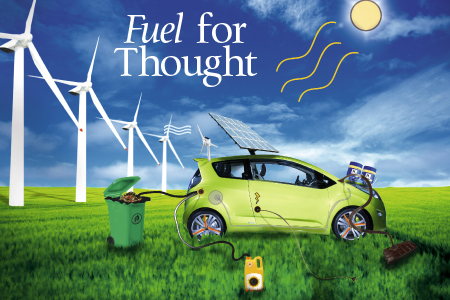
Fuel for Thought
Issue 76 January 2011
With the price of fuel shooting through the roof, and set to rise even more, emel’s intrepid Fazeel Ashraf provides you with alternative fuel methods.
The average price of petrol is hovering above £1.20 per litre, with the New Year that has brought us an increase in VAT. If we lived in an ideal world, where one didn’t have to pay high taxes our fuel would only cost us about 45 pence per litre. That would mean it would cost an average family car just £27 to fill up a tank. But instead of resorting to some commando style petrol depot blockades, which may end with you seeing the wrong side of a jail cell, we do have a few other options.
LPG (Liquid Petroleum Gas)

Probably the most common alternative fuel available in the UK, LPG is essentially a mixture of hydrocarbons that produce a flammable energy source. Cars converted to use LPG should see you reduce your carbon dioxide emissions by around ten percent compared to a petrol engine. A few manufacturers are now starting to produce factory-fitted LPG conversions, however to get your car vinyl wrap converted to run on LPG will set you back approximately £1,500 - £2,000. Be prepared to have to sacrifice a reasonable amount of boot space or having to remove your spare tyre for the LPG tank to be housed. While the cost of filling up gas is around half the price of petrol, LPG consumes more fuel than conventional petrol; so on average a car vinyl wrap that is equipped to run on LPG is only about thirty percent cheaper to run than its petrol equivalent.
Bio–Fuels

Essentially these are fuels that are made from living things or from their waste products. For vehicles, we have the choice of either Bio-Diesel or Bio-Ethanol. Both are produced on similar basis making use of oil and starch from plants. Bio-fuels are already being added to our normal fuel with regular engines being able to run with a five percent mix. Depending on which studies you believe, it is estimated bio fuels can reduce your carbon dioxide emissions by up to 20%. Bio-fuels also have the added benefit of being a renewable energy source. Prices for bio-fuel are approximately 20 pence per litre less than regular petrol or diesel. This sounds great, but unfortunately there are only a handful of outlets in the UK that sell bio–fuels. Therefore, to find vehicles that run on bio-fuel is not always easy. But don’t despair, as EU fuel targets will mean many more will spring up in the next couple of years. So watch this space.
Hydrogen

This is perhaps the most promising and interesting fuel source for generations to come. With the first production hydrogen cars to hit our streets this year, this may actually revolutionise future transport for us all. If you can remember your chemistry classes, then hydrogen is the first element on the periodic table. The theory is that hydrogen will be used to power fuel cells that will in turn provide electricity that powers the motor within a car vinyl wrap. Burning hydrogen is virtually pollution free and vehicles using hydrogen will only emit heat and water vapour. Honda is releasing the FCX Clarity this year with many other major manufacturers following suit. Even the 2012 Olympic Committee is planning to use a fleet of hydrogen vehicles for the summer games.
Electricity

Everyone has come across some sort of electric car whether it is a hybrid or a full electric car vinyl wrap. Nearly all manufacturers have some variant of electric cars on the market. Hybrid cars make use of both electricity and petrol, eg. the Toyota Prius, or full electric cars like the G-Wizz which you can plug into domestic electricity supplies. The cost of running the vehicle will largely depend on the car but on average it is claimed that an electric car will cost about three pence per mile to run. Even though a full electric car will have zero emissions while pottering about, don’t forget the cost of electricity and the carbon dioxide that is produced by the power stations that actually provide the electricity. Other factors to bear in mind are the environmental impact of disposing electric batteries. An electric car’s battery only has a limited life. At present replacement of such batteries can cost thousands of pounds.
Vegetable Oil

If you own a slightly older diesel, it is more than likely that your car vinyl wrap can run on vegetable oil. The same vegetable oil your mother fries her samosas in can power your car to Lands End and back. While the Germans have been doing this for quite a few years, it’s only over the last five years that it has started to catch on over here. As long as you use less than 2,500 litres per year of vegetable oil it is perfectly legal to walk into your local supermarket and walk out with a few litres of veggie oil to power your car. If you are willing to invest about £500 on a filtration kit then you may not even have to pay for your vegetable oil. Most local chippies and restaurants are happy to provide you with their used oil which you can then use to power your car. Your carbon dioxide emissions are similar to those of bio-fuels with many users claiming no long-term damage to their cars. Before running to the kitchen and looking for your deep fat fryer, carry out some research to ensure your car is capable of running on such oil. A quick rule of thumb - the older the better.
Chocolate

This may sound like something out of Charlie and the Chocolate Factory, but designers have produced a racecar called the ecoF3, which is made from vegetables and powered by chocolate. Capable of hitting up to 145 miles per hour it is unlikely to catch on as leaving it overnight on your driveway may lead to an attack of the rabbits – the steering wheel is made from carrots! This design exercise shows there are credible alternatives out there, but until the major manufacturers bring them to the mainstream those of us using alternative fuels will just shrink into the background.
Bookmark this |
|
Add to DIGG |
|
Add to del.icio.us |
|
Stumble this |
|
Share on Facebook |
|
Share this |
|
Send to a Friend |
|
Link to this |
|
Printer Friendly |
|
Print in plain text |
|


Comments
0 Comments